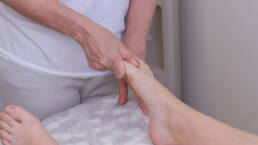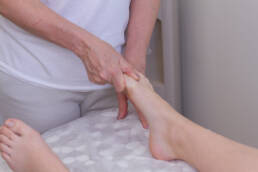Welcome to the Inner Vitality blog, your trusted resource for holistic health and wellness in Fort Collins. At Inner Vitality, we are dedicated to providing compassionate chiropractic care to help you achieve optimal health and vitality.
Today, we delve into the topic of Peripheral Neuropathy – a condition that affects millions of people worldwide, causing pain, tingling, numbness, and weakness in the hands and feet. Understanding this condition is crucial for those who suffer from it and for anyone seeking natural, effective ways to manage its symptoms.
Overview of Peripheral Neuropathy
Peripheral Neuropathy is a disorder of the peripheral nervous system, which comprises the nerves outside the brain and spinal cord. This condition can manifest in various forms, including diabetic neuropathy, postherpetic neuralgia, and more.
Individuals with Peripheral Neuropathy often experience uncomfortable symptoms such as pain, tingling, numbness, and weakness in their extremities. These symptoms can significantly impact one’s quality of life, making everyday tasks challenging and affecting overall well-being.
The causes of Peripheral Neuropathy are diverse and can include diabetes, infections, exposure to toxins, and certain medications. Understanding the underlying cause is essential for effective management and treatment.
Types of Peripheral Neuropathy
Peripheral Neuropathy isn’t a singular condition but rather a term that encompasses a variety of disorders resulting from damage to the peripheral nervous system. Two common types that illustrate the condition’s diversity are diabetic neuropathy and postherpetic neuralgia.
Diabetic Neuropathy
This type is a direct result of the long-term high blood sugar levels associated with diabetes. It affects roughly half of those with diabetes and can lead to serious complications, including foot ulcers, infections, and even amputation. Diabetic neuropathy primarily targets the nerves in the legs and feet.
Postherpetic Neuralgia
Following a bout of shingles, an illness caused by the reactivation of the varicella-zoster virus (the same virus responsible for chickenpox), some individuals develop this chronic nerve pain. Postherpetic neuralgia illustrates how an infection can lead to peripheral neuropathy, causing lasting pain even after the skin lesions have healed.
Common Symptoms
The symptoms of Peripheral Neuropathy can be highly variable, but most individuals experience a combination of the following:
- Pain: This can range from mild to severe and may be described as stabbing, throbbing, or burning.
- Tingling and Numbness: Often likened to the sensation of wearing an invisible glove or sock, these sensations are typically the first signs of nerve damage.
- Weakness: Muscles may become weak, leading to difficulty in grasping objects, walking, or performing other daily activities.
- Sensitivity to Touch: For some, even a light touch can be painful or uncomfortable.
These symptoms usually progress gradually and may worsen at night. Early diagnosis and treatment are crucial in managing Peripheral Neuropathy effectively and preventing further nerve damage.
Causes and Risk Factors
Peripheral Neuropathy can result from various factors, with diabetes being one of the most common causes. However, several other conditions and exposures can lead to this nerve damage, including:
- Infections: Certain viral and bacterial infections, including Lyme disease, shingles, Epstein-Barr virus, hepatitis C, and HIV, can cause Peripheral Neuropathy.
- Exposure to Toxins: Chemicals used in chemotherapy, as well as heavy metals like lead and mercury, can damage peripheral nerves.
- Genetic Disorders: Some forms of Peripheral Neuropathy are hereditary, resulting from genetic mutations that affect nerve health.
- Autoimmune Diseases: Conditions where the immune system attacks the body’s tissues can lead to nerve damage. Examples include rheumatoid arthritis, lupus, and Sjögren’s syndrome.
- Physical Injury: Trauma from accidents, falls, or sports injuries is a common cause of nerve damage. Repetitive motions or prolonged pressure on a nerve can also result in neuropathy.
- Other Diseases and Conditions: Kidney disorders, liver diseases, hormonal imbalances, blood disorders, and tumors can press on nerves, leading to neuropathic symptoms.
Understanding the specific cause of an individual’s Peripheral Neuropathy is essential for targeting treatment and managing symptoms effectively. At Inner Vitality, we assess each patient’s unique situation to tailor a treatment plan that addresses the underlying causes and provides relief from the debilitating symptoms of this condition.
The Impact of Peripheral Neuropathy
Peripheral Neuropathy can profoundly affect daily life and overall well-being, influencing everything from mobility to sleep quality. Its symptoms can make simple tasks challenging, affecting an individual’s independence and reducing their quality of life.
Daily Life and Well-being
The pain, numbness, and weakness associated with Peripheral Neuropathy can make everyday activities difficult. For instance, numbness in the feet can affect balance and walking, increasing the risk of falls. Similarly, weakness in the hands can make it hard to grasp objects, affecting one’s ability to perform tasks requiring fine motor skills, such as buttoning a shirt or typing.
Furthermore, the chronic pain common to many types of Peripheral Neuropathy can interfere with sleep, leading to fatigue and decreased energy levels during the day. This disruption to normal sleep patterns can exacerbate other symptoms and lead to a vicious cycle of pain and sleeplessness.
Psychological Impact
The ongoing struggle with chronic pain and the limitations it imposes can also take a significant toll on mental health. Individuals with Peripheral Neuropathy may experience anxiety and depression, feeling isolated by their condition and its impact on their lifestyle. The constant discomfort can affect concentration, mood, and overall psychological well-being.
Statistics on Peripheral Neuropathy
Peripheral Neuropathy is a widespread condition affecting millions worldwide. In the United States alone, it’s estimated that about 20 million people have some form of Peripheral Neuropathy. Though specific statistics for the Fort Collins community might not be readily available, the prevalence of conditions like diabetes—a leading cause of Peripheral Neuropathy—suggests that a significant portion of the local population could be affected.
Traditional Approaches to Managing Peripheral Neuropathy
Managing Peripheral Neuropathy often involves a multifaceted approach, incorporating medication, physical therapy, and, in some cases, surgical intervention.
Medical Treatments
- Medications: These can include pain relievers, anti-seizure medications, capsaicin cream, and antidepressants, which are used to manage pain and other symptoms. However, these medications can only provide symptomatic relief and do not address the underlying cause of neuropathy.
- Physical Therapy: Aims to strengthen muscles, improve gait, and reduce pain. Physical therapy can be especially beneficial for those whose balance and mobility have been affected.
- Surgical Options: In cases where neuropathy is caused by pressure on nerves (for example, from tumors or herniated discs), surgery may be required to relieve the pressure and alleviate symptoms.
Limitations and Side Effects of Conventional Treatments
While traditional treatments can offer symptom relief, they often come with limitations and side effects. Medications, for instance, may cause drowsiness, dizziness, or dependency, particularly in the case of opioids prescribed for pain management. Furthermore, these treatments typically address the symptoms rather than the root cause of neuropathy, which means they may offer temporary relief without halting the progression of the disease.
In light of these challenges, many individuals with Peripheral Neuropathy seek alternative or complementary treatments, such as chiropractic care, to manage their condition. Chiropractic approaches focus on improving nerve function and overall body health, potentially offering a more holistic solution to managing Peripheral Neuropathy.
The Role of Chiropractic Care in Managing Peripheral Neuropathy
Chiropractic care offers a unique and holistic approach to managing Peripheral Neuropathy, focusing on enhancing the body’s natural healing capabilities and addressing the underlying causes of the condition. At Inner Vitality, we believe in the power of the body to heal itself when provided with the right environment and support.
Philosophy Behind Chiropractic Care
Chiropractic care is based on the principle that the body has an innate ability to heal itself when the nervous system is functioning optimally. By realigning the spine and ensuring proper nerve function, chiropractors aim to remove interference in the nervous system, allowing the body to heal and function at its best. This philosophy aligns perfectly with the goals of managing Peripheral Neuropathy, as it focuses on improving nerve function and overall health.
Specific Chiropractic Techniques for Peripheral Neuropathy
At Inner Vitality, we employ a variety of chiropractic techniques tailored to the needs of each individual patient. These techniques may include spinal adjustments, nerve mobilization, soft tissue therapy, and therapeutic exercises designed to alleviate pain, improve mobility, and enhance nerve function. By addressing spinal misalignments and reducing pressure on nerves, chiropractic care can help relieve the symptoms associated with Peripheral Neuropathy.
How Inner Vitality Approaches Peripheral Neuropathy
At Inner Vitality, we take a holistic approach to managing Peripheral Neuropathy, addressing not only the symptoms but also the underlying causes of the condition. Our comprehensive approach includes:
Holistic Approach
We believe that true healing involves treating the whole person, not just the symptoms of the disease. In addition to chiropractic care, we offer lifestyle and nutritional advice to support overall health and well-being. This holistic approach ensures that patients receive comprehensive care tailored to their individual needs.
Initial Consultation
During the initial consultation at Inner Vitality, new patients can expect a thorough evaluation of their health history, symptoms, and lifestyle factors. Our chiropractors will conduct a physical examination and may recommend diagnostic tests to identify the underlying causes of Peripheral Neuropathy. This information helps us develop a personalized treatment plan that addresses the unique needs of each patient.
Tailored Treatment Plans
At Inner Vitality, we understand that no two patients are alike, which is why we create personalized treatment plans for managing Peripheral Neuropathy. These plans may include a combination of chiropractic adjustments, therapeutic exercises, dietary recommendations, and lifestyle modifications aimed at reducing inflammation, improving nerve function, and relieving symptoms. By tailoring treatment plans to the individual needs of each patient, we can achieve optimal results and help them regain control of their health and well-being.
Conclusion
Peripheral Neuropathy is a challenging condition that can significantly impact daily life and overall well-being. However, there is hope for those affected by this condition, and chiropractic care at Inner Vitality offers a promising solution.
Through the philosophy of enhancing the body’s natural healing capabilities, specific chiropractic techniques, and a holistic approach to wellness, Inner Vitality aims to provide relief and support to individuals struggling with Peripheral Neuropathy. Our personalized treatment plans address not only the symptoms but also the underlying causes of the condition, helping patients achieve lasting improvements in their health and quality of life.
If you or a loved one is experiencing symptoms of Peripheral Neuropathy, don’t wait to seek help. Contact Inner Vitality today to schedule a consultation and take the first step toward relief. Our experienced chiropractors are here to listen, support, and guide you on your journey to better health and well-being.
Don’t let Peripheral Neuropathy control your life any longer. Experience the difference that chiropractic care at Inner Vitality can make. Call us now to book your appointment and start your path to recovery. Your health and vitality are our top priorities, and we’re committed to helping you live your best life possible.

Ready for an expert opinion? Set up an appointment today!
Dr. Jeremy Overholt, your Fort Collins chiropractor, is your go-to expert for comprehensive chiropractic care. With years of experience and a dedication to your well-being, he specializes in treating a vast array of health issues to help you live a healthier, more comfortable life.
Like this article? Spread the word!
Related Posts
October 4, 2023
How Chiropractic Care and Shockwave Therapy Can Make a Difference in Peripheral Neuropathy Pain
Meta Description: Discover relief from peripheral neuropathy at Inner Vitality…
October 4, 2023
Relief from Peripheral Neuropathy: How Chiropractic Care at Inner Vitality Can Help
Discover relief from peripheral neuropathy through holistic chiropractic care at Inner…
April 23, 2024
Healing After the Impact: The Role of Chiropractic Care in Auto Injury Recovery
Heal and recover from auto injuries with chiropractic care at Inner Vitality Chiropractic…





